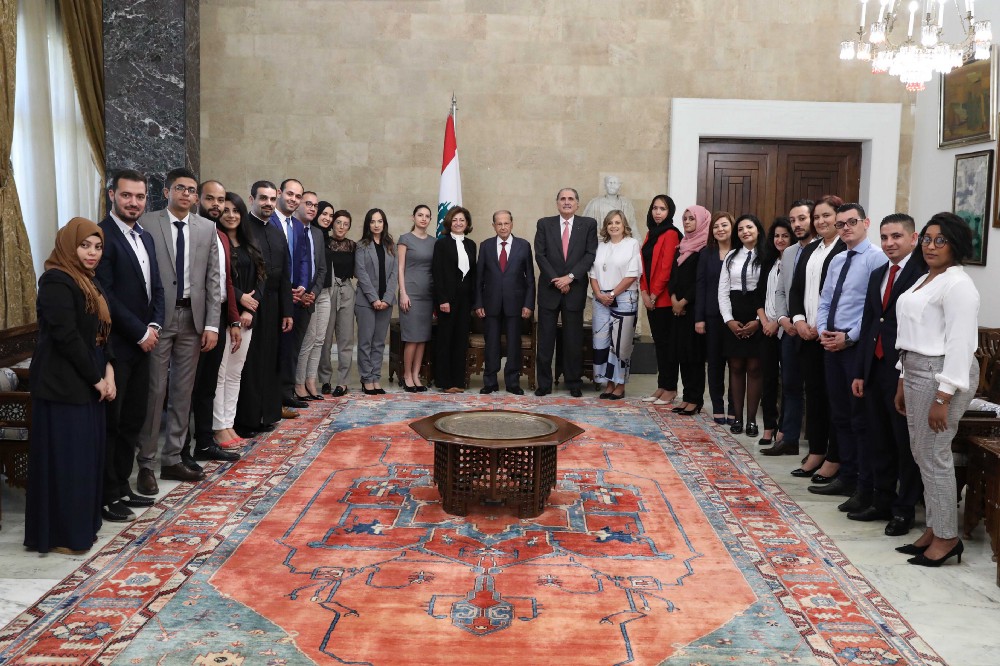-
What We Do
- WHERE WE WORK
-
About Us
 Welcome Message from Carol Jenkins
Welcome Message from Carol JenkinsFor more than 90 years, World Learning has equipped individuals and institutions to address the world’s most pressing problems. We believe that, working together with our partners, we can change this world for the better.
On my travels, I’ve had the opportunity to meet with many of those who have joined us in this mission. In Baghdad, we’ve trained more than 2,300 Iraqi youth who are already giving back at home. In London, our partners in the TAAP Initiative strongly believe that we are all responsible to practice inclusion. And in Vermont, our Experiment in International Living and School for International Training participants prove every day that they have the tools and the determination to change the world.
Please join us in our pursuit of a more peaceful and just world.
- Get Involved
Media Center > Story
LDF Fellows Meet With Lebanese President to Discuss Critical Regional Issues
October 29, 2018

It’s not every day that young people have the opportunity to talk with global leaders about critical issues. But on October 2, a group of young professionals from across the Middle East and North Africa met with Lebanese President General Michel Aoun and other Lebanese officials to discuss political, social, and economic issues affecting the region.
The meeting was arranged as part of the Leaders for Democracy Fellows (LDF) Program, administered by World Learning under the direction of Country Representative Dr. Wafa Kotob. Funded by the U.S. Department of State’s U.S.-Middle East Partnership Initiative (MEPI), LDF seeks to enable early- and mid-career professionals from across the Middle East and North Africa (MENA) to solve local challenges. The program is comprised of twin tracks, a U.S.-based program for English-speaking participants and a program based in Lebanon for Arabic speakers. Fellows engage in academic coursework and internships to help them build networks and glean insight from experts in their fields.
LDF fellows also have unique opportunities like their meeting with President Aoun.
“For someone to be a great leader, he has to have a great and open heart and great values,” says Abdulrahman, one of the young professionals in the group. “This is what we found in his Excellency Mr. Michel Aoun, who dedicated his precious time to us in order to convey his ideas of leadership and share with us the values of Lebanon, the beloved country in which we spent three months of our lives and that now has a special place in our hearts.”
During the meeting, which took place at the presidential palace in Beirut, fellows had a constructive conversation with President Aoun as well as Lebanon’s Minister of Justice Salim Grissati and the Chairperson of the National Commission for Women’s Affairs, Claudine Aoun Roukos.
The fellows were able to ask questions about the issues they’re concerned about such as freedom of speech, the status of refugees, women’s empowerment, and democracy building. President Aoun told the group that his government is making efforts to support women’s rights despite difficulties within society. He also shared his belief that there are limits to free speech when it becomes defamation but that it is a freedom protected by the Lebanese constitution.
The LDF fellows said they were grateful for the meeting with President Aoun, which gave them insight from his experiences.
“When leaders listen to the voices of youth, when they offer them free space to share their visions, ideas, challenges and views, when youth are given answers to their inquiries and concerns, only then a leader is worthy of his title,” says one of the fellows, Bouthaina Al-Selwi. “Thank you to his Excellency, Mr. Michel Aoun, and to World Learning for this wonderful opportunity.”
Since 2012, and with funding from USAID, the U.S.-Middle East Partnership initiative (MEPI), and the World Bank, World Learning has maintained an active presence in Lebanon. We have built the capacity of more than 150 civil society, government, and private sector institutions to effectively serve their communities; improved educational services for more than 300,000 students from more than 1,000 public schools across the country as USAID’s lead implementer on the Quality Instruction Towards Access and Basic Education Improvement program; and enhanced the capacity of around 150 leaders and civil rights activists from countries in the Middle East and North Africa through the MEPI-funded LDF program. Through these projects, World Learning Lebanon has developed a profound understanding of the challenges Lebanon is facing as a result of the influx of Syrian refugees, as well as an expertise in the public education sector in Lebanon, capacity-building of NGOs and CBOs, and educational research.





